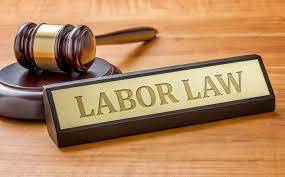LABOUR LAW
Indian Govt is likely to implement new labour laws from July 1, 2022. There will be major changes to take-home salary, working hours, employee's provident fund (EPF)contributions & annual leaves etc.
Here's what new Labour Laws have in store for you.
1. Take-home salary & PF contributions.
Under the new law, the employees' take-home salary will also change significantly as the basic salary will be at least 50% of the gross monthly salary. This will also increase the PF contributions made by employees and employers.
The in-hand salary is going to be affected more for the employees in the private sector. Under the new labour laws, the retirement corpus and gratuity amount will increase. Here's what new Labour Laws have in store for you
2.4-day work week with 12 hours daily shift
Under the new labour laws, employees will have to work for four days instead of five. However, on those four working days, employees will have to work 12 hours each day.
The labour ministry had earlier made it clear that if and when the proposal comes through, the 48-hour weekly work requirement has to be met. This will be applicable to every industry but may change from state to state depending on the rules set by a state govt.
Here's what new Labour Laws have in store for you.
3. Annual leaves
Employees can encash their unused leaves annually. As per new law, an employee can take a break after every 20 work days instead of the original 45 work days. Employees are also eligible to apply to leave the company after 180 days of joining instead of the initial 240 days
Here's what new Labour Laws have in store for you
4. Full & final settlement
The payment of salary to an employee who is getting separated from the company for various reasons including resignation, retrenchment or termination, be made “ within two working days of his or her exit.”
Here's what new Labour Laws have in store for you
5. With the implementation of new wage Code, there could be major changes in Earned Leave Policy
The biggest change can be seen in Earned Leave Policy. The Labour Union has been demanding to increase the number of holidays to 450 in the new code. At present, there are 240 to 300 holidays in different departments.
For example, if an employee has 45 days of leave at the end of the calendar year, an employer will be required to pay 15-day leave encashment. The remaining 30 days of leave will be carried forward to the following calendar year.
What is labour Law?
Labour law, the varied body of law applied to such matters as employment, remuneration, conditions of work, trade unions, and industrial relations. In its most comprehensive sense, the term includes social security and disability insurance as well. Unlike the laws of contract, tort, or property, the elements of labour law are somewhat less homogeneous than the rules governing a particular legal relationship.
In addition to the individual contractual relationships growing out of the traditional employment situation, labour law deals with the statutory requirements and collective relationships that are increasingly important in mass-production societies, the legal relationships between organized economic interests and the state, and the various rights and obligations related to some types of social services.
Labour law has won recognition as a distinctive branch of the law within the academic legal community, but the extent to which it is recognized as a separate branch of legal practice varies widely depending partly on the extent to which there is a labour code or other distinctive body of labour legislation in the country concerned, partly on the extent to which there are separate labour courts or tribunals, and partly on the extent to which an influential group within the legal profession practice
specifically as labour lawyers.
Labour Law PPT
Keywords
labour Law
new labour law
what is labour law.
when labour law start





